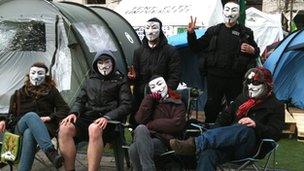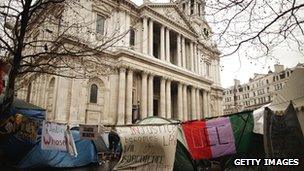Occupy London St Paul's eviction appeal bid thrown out
- Published

Occupy campers described the ruling as a "blow"
Protesters have been refused permission to appeal against their eviction from the Occupy London camp outside St Paul's Cathedral.
Occupy London challenged the High Court's decision that the City of London Corporation's move to evict its camp was "lawful and justified".
The Court of Appeal's decision to refuse the application means the corporation is free to clear the site.
"All appeals denied but fight not over," Occupy London said on Twitter.
"Having a central focus point at St Paul's can still be maintained [without] residential tents but this isn't a setback."
The City of London Corporation called on the protesters to leave immediately.
Occupy London, which campaigns against corporate greed, set up the camp on 15 October. There are currently about 120 tents at the site.
Protesters say they plan to remove two large tents which housed the "kitchen" and "Tent City University" as they were donated to the group and they did not want them destroyed during the eviction.
'Planning law breach'
Refusing permission to appeal, the judges headed by the Master of the Rolls Lord Neuberger, said despite passionate views held by protesters, no significant new evidence had been presented which justified an appeal.
Stuart Fraser, the City of London Corporation's policy chairman, said the authority welcomed the ruling and called on protesters to "comply with the decision of the courts" and remove tents and equipment "voluntarily right away".
He said: "Everyone has had their day in court.
"Peaceful protest is a democratic right but the camp is clearly in breach of highway and planning law."
Last month, High Court judge Mr Justice Lindblom granted the City of London Corporation orders of possession and injunctions.
The authority sought a possession order after Occupy London ignored a ruling to clear its tents from the public highway.
Protester George Barda: "The rights of bankers have come above the interests of justice and fairness"
The five protesters who appealed against the High Court's decision were Tammy Semede, George Barda, Daniel Ashman, Stephen Moore and Paul Randle-Joliffe.
Michael Paget, the lawyer for Ms Semede, said the protesters were liaising with the City of London Corporation to remove tents in a "proper and considered way".
This was important because there was a lot of "paraphernalia" at the camp, and also "vulnerable people", Mr Paget said.
Speaking about the ruling, he said the seriousness of Occupy's message had never been questioned.
"The Occupy message has been heard and will continue to be heard," he said.
"It has made a difference and it will continue to make a difference."
Matthew Varnham, of the Occupy movement, said the local authority had not provided a timetable for the eviction of the camp which the group considered "reckless".
'Undue influence'
A protester from hacker group Anonymous, who has been at the camp since October and did not wish to be named, said the movement had not been defeated.
He said: "The decision is a bit of a slap in the face for the right to protest and it also highlights that the corporation is having undue influence over the system."
In legal terms, Mr Paget said, the Court of Appeal's decision is the end of the road for the protesters in the UK courts.
They could still lodge a case at the European Court of Human Rights, but that would not stop the eviction.
The protesters are due to decide their next course of action at a meeting later, but have suggested that they could move to the other two occupations in the capital - in Finsbury Square and the School of Ideas in Featherstone Street, Islington.
The campaign group have briefed the people in the camp about how to avoid arrest and circulated numbers for lawyers they could contact if they are arrested.

St Paul's Cathedral said it hoped protesters would leave peacefully
Protesters said they plan to stream the eviction live on their website. The group added that people in the camp were free to leave if they did not want to face the bailiffs.
Following the ruling the Chapter of St Paul's Cathedral said: "We very much hope that today's decision by the Court of Appeal will now lead to a peaceful dispersal of the camp outside St Paul's.
"For the past five months we have sought to focus on the important ethical issues raised by the Occupy movement, and we remain committed to engage with these issues."
London Connection, the St Paul's initiative set up by the Bishop of London to connect finance and ethics, said the campaign would continue.
Spokesman Ken Costa said: "It has become clear that there is a need to look again at the structures of the market economy.
"During the last few months London Connection has been working to bring together the people concerned with the issues relating to responsible capitalism and we will continue this dialogue going forward."
- Published22 February 2012
- Published18 January 2012
- Published18 January 2012